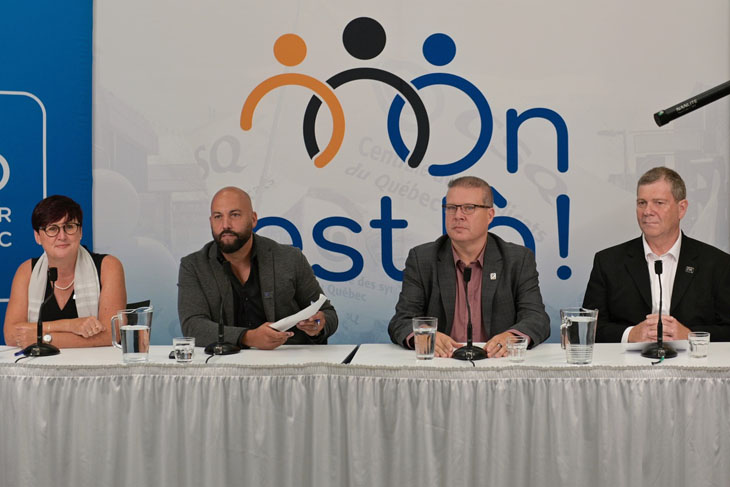30 August 2022

The Centrale des syndicats du Québec (CSQ) and its federations in the school sector are taking advantage of the onset of a new school year to challenge the Legault government and its Minister of Education on the staff shortage issues plaguing the public education sector, shortages which are affecting services to students. This will be a key issue in the school year that is just getting under way as well as in the upcoming round of negotiations.
Speaking as a group in a joint press conference, the presidents of the CSQ, Éric Gingras, the Fédération des syndicats de l’enseignement (FSE-CSQ), Josée Scalabrini, the Fédération du personnel de soutien scolaire (FPSS-CSQ), Éric Pronovost, and the Fédération des professionnelles et professionnels de l’éducation du Québec (FPPE-CSQ), Jacques Landry, are saying that now that managing the pandemic has become less of a concern for the government, education must take its place as the government’s top priority.

From right to left: Josée Scalabrini (FSE-CSQ), Éric Gingras (CSQ), Éric Pronovost (FPSS-CSQ) and Jacques Landry (FPPE-CSQ)
“A government that feels an urgency to act is capable of acting quickly, if it has the political will to do so. The emergency in health care clearly demonstrated this. But the shortage of education staff was an issue of concern before the pandemic and has only worsened over the last three years. The problem of attracting and retaining workers is generating increasingly worrying situations in the school sector, overburdening staff already in place and threatening the quality and accessibility of the services we are supposed to be providing to Quebec students,” says CSQ President Éric Gingras, emphasizing that we have moved beyond the stage of recruitment advertising campaigns.
“Yes, our staffing needs are urgent, but this is nothing new. And all these appeals to bail out the staff of our schools and centers have an impact on staff morale – teachers, support staff and professionals – when they are not accompanied by structural measures that genuinely value the work, the skills and the professionalism of those who work in the education sector, measures that would make all jobs in the sector more attractive and more competitive.”
Éric Gingras points out that this will impose a special mandate on the public sector negotiations that are slated to begin in the coming weeks, a rendezvous that the government must not miss for the sake of the future of Quebec students. “The government must take full responsibility for the situation and move beyond the traditional confrontational approach. We have solutions to offer that will breathe new life into our public education system, and this starts at the negotiating tables.”
Listen to our teachers
“It’s really not complicated! If the government really wants to attract the most qualified new employees, substantial improvements to working conditions are required. Teachers are clear on this: they want group sizes to be adjusted based on the needs of students and more balanced classrooms. They want lighter workloads that would enable them to devote more time to the success of their students through teaching, course preparation and correcting. This is what motivates them on a daily basis. “Other tasks” disproportionately take up their time. Listening to teachers express these needs will lead to improved learning conditions for our students. It would also provide solutions to the staff shortage.” – FSE-CSQ President Josée Scalabrini.
The aberration of greater precariousness in the midst of a staff shortage
In the context of this shortage, Éric Pronovost says: “I don’t understand the logic of many school service centers; once again this year we are seeing a high number of positions consisting of less than 25 hours. How can we attract school support staff to work in our schools when they are already dealing with a significant increase in the cost of living and there are so many needs to be met in our schools and centers? Many administrators are stingy with their budgets, so the government needs to quickly step in to ensure that students get what they need. Our members are telling us they no longer want to work in a crisis situation, they want to move upstream and work to prevent problems rather than continue to suffer from them.” – FPSS-CSQ President Éric Pronovost.
We must stop resorting to private education services
“There is such a serious shortage of professionals in our schools that the ministry has given up, so to speak, by opening the door wide to private agencies, which are invading our schools as they have already invaded our health sector. This obviously raises the whole question of universal access to services for those who depend on them.
We’re not the only ones worried about the shortage of professional services for our students, the Quebec Ombudsman sharply denounced this major public shortcoming last June.
It’s obvious, however, that school professionals are in the best position to provide adapted services to students in our schools, in close collaboration with teachers, parents and other community stakeholders.
With over 500 vacant professional positions, the solution is to reorganize the work of professionals and offer them conditions competitive with the private sector, to attract them and keep them where they really can make a difference: in our schools.” – FPPE-CSQ President Jacques Landry.
It should also be noted that the Centrale des syndicats du Québec (CSQ), the Confédération des syndicats nationaux (CSN) and the Fédération des travailleurs et travailleuses du Québec (FTQ) have announced the formation of a common front to negotiate with the government with one voice. Public sector collective agreements will expire in less than a year, on March 31, 2023.
